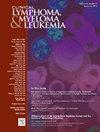LOXO-338是一种口服选择性Bcl-2抑制剂,用于晚期血液恶性肿瘤患者的首次人体I期研究。
IF 2.7
4区 医学
Q2 HEMATOLOGY
引用次数: 0
摘要
背景:LOXO-338是一种新型的口服生物可利用的Bcl-2小分子抑制剂,旨在实现对Bcl-2的选择性,从而避免与Bcl-xL抑制相关的剂量限制性血小板减少症。这项首次人体开放标签i期研究调查了LOXO-338在慢性淋巴细胞白血病(CLL)、小淋巴细胞淋巴瘤(SLL)或b细胞非霍奇金淋巴瘤(NHL) (NCT05024045)患者中的应用。患者和方法:组织学证实的既往接受≥2种治疗的晚期b细胞恶性肿瘤患者入组1期剂量递增(间隔3 + 3设计)。LOXO-338口服50 - 300mg,每日一次,直至因疾病进展或不可接受的毒性而停药。主要目的是确定LOXO-338的最大耐受剂量(MTD)/推荐的2期剂量。次要目标包括安全性、耐受性、药代动力学和初步抗肿瘤活性。结果:共治疗CLL/SLL (n = 10)或NHL (n = 17)患者27例。未发生剂量限制性毒性,未达到MTD。23例(85%)患者发生治疗后出现的不良事件;贫血(22%)和疲劳(22%)是最常见的。治疗相关不良事件(TRAEs)发生率为15%,主要为1级(11%)或2级(4%);≥3级或严重trae未见报道。未见肿瘤溶解综合征。总有效率为19% (95% CI: 6.3, 38.1),疾病控制率为67% (95% CI: 46, 83.5)。LOXO-338具有口服生物利用度,暴露量随剂量增加而增加。结论:LOXO-338在既往治疗的晚期血液恶性肿瘤患者中具有良好的耐受性和良好的安全性。在这个经过大量预处理的人群中观察到初步疗效,支持进一步的研究。本文章由计算机程序翻译,如有差异,请以英文原文为准。
A First-in-Human Phase I Study of LOXO-338, an Oral Selective Bcl-2 Inhibitor, in Patients With Advanced Hematologic Malignancies
Background
LOXO-338 is a novel, orally bioavailable small-molecule inhibitor of Bcl-2, designed to achieve selectivity for Bcl-2 over Bcl-xL, thus avoiding dose-limiting thrombocytopenia associated with Bcl-xL inhibition. This first-in-human, open-label, Phase 1 study investigated LOXO-338 in patients with chronic lymphocytic leukemia (CLL), small lymphocytic lymphoma (SLL), or B-cell non–Hodgkin lymphoma (NHL) (NCT05024045).
Patients and Methods
Patients with histologically confirmed advanced B-cell malignancies who had received ≥ 2 prior therapies were enrolled in Phase 1 dose escalation (interval 3 + 3 design). LOXO-338 was administered orally as 50 to 300 mg once-daily dose until discontinuation due to progressive disease or unacceptable toxicity. The primary objective was to determine the maximum tolerated dose (MTD)/recommended Phase 2 dose of LOXO-338. Secondary objectives included safety, tolerability, pharmacokinetics, and preliminary antitumor activity.
Results
In total, 27 patients with CLL/SLL (n = 10) or NHL (n = 17) were treated. No dose-limiting toxicities occurred and the MTD was not reached. Treatment-emergent adverse events occurred in 23 patients (85%); anemia (22%) and fatigue (22%) were the most prevalent. Treatment-related adverse events (TRAEs) occurred in 15% and were mostly grade 1 (11%) or 2 (4%); grade ≥ 3 or serious TRAEs were not reported. Tumor lysis syndrome was not observed. The overall response rate was 19% (95% CI: 6.3, 38.1) and disease control rate was 67% (95% CI: 46, 83.5). LOXO-338 was orally bioavailable with dose-dependent increases in exposure.
Conclusion
LOXO-338 was well tolerated with a favorable safety profile in previously treated patients with advanced hematologic malignancies. Preliminary efficacy was observed in this heavily pretreated population supporting further investigation.
求助全文
通过发布文献求助,成功后即可免费获取论文全文。
去求助
来源期刊

Clinical Lymphoma, Myeloma & Leukemia
ONCOLOGY-HEMATOLOGY
CiteScore
2.70
自引率
3.70%
发文量
1606
审稿时长
26 days
期刊介绍:
Clinical Lymphoma, Myeloma & Leukemia is a peer-reviewed monthly journal that publishes original articles describing various aspects of clinical and translational research of lymphoma, myeloma and leukemia. Clinical Lymphoma, Myeloma & Leukemia is devoted to articles on detection, diagnosis, prevention, and treatment of lymphoma, myeloma, leukemia and related disorders including macroglobulinemia, amyloidosis, and plasma-cell dyscrasias. The main emphasis is on recent scientific developments in all areas related to lymphoma, myeloma and leukemia. Specific areas of interest include clinical research and mechanistic approaches; drug sensitivity and resistance; gene and antisense therapy; pathology, markers, and prognostic indicators; chemoprevention strategies; multimodality therapy; and integration of various approaches.
 求助内容:
求助内容: 应助结果提醒方式:
应助结果提醒方式:


